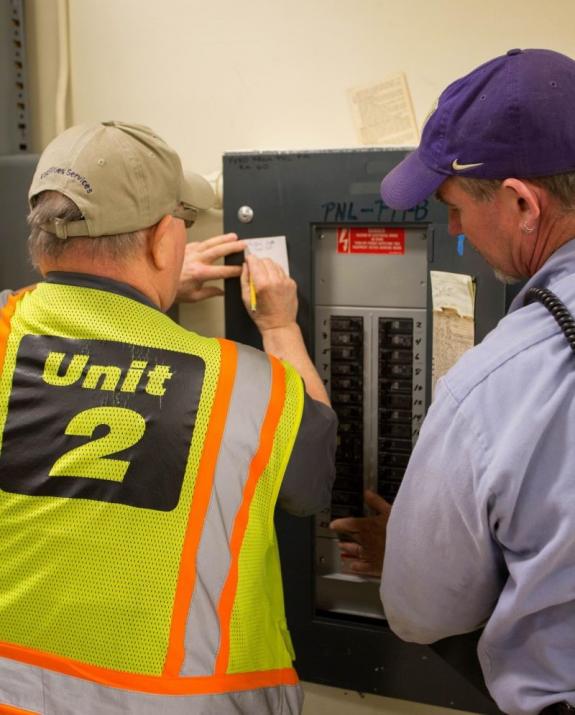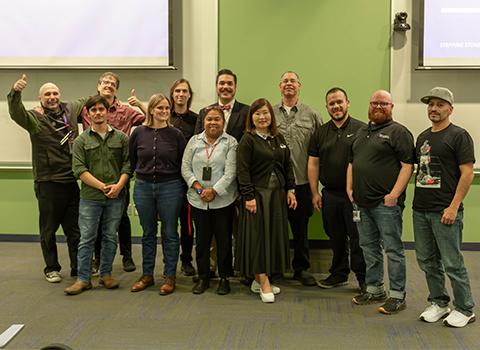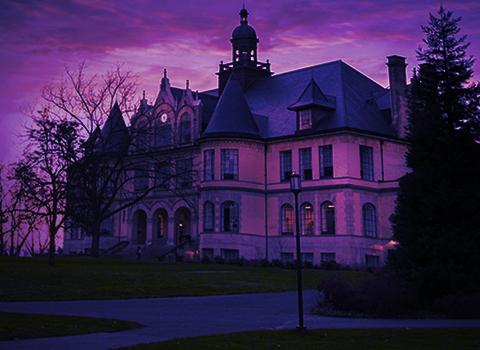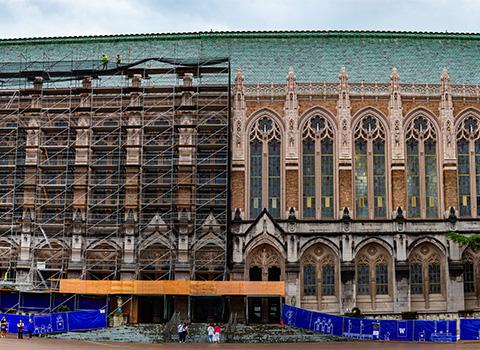Unit-2 Night Owls

Bill Sieg and Curtis Nilson fix a power outage in the Wilcox Annex.
The Unit-2 team includes Facilities Operations Maintenance Specialists Dennis Dubay, Katie Green, Lee Hand, Pat Lauterbach, Rashaan Leex, Darryl Milus, Curtis Nilson, Mike Renner, Bill Sieg and Vince Stanton, and Manager Guarrin Sakagawa.
If there’s something strange in your neighborhood, and it’s something weird that doesn’t look good, who ya gonna call?
For the University of Washington, it’s not Ghostbusters, but the Facilities Operations Maintenance Specialists (FOMS) crew, more commonly known by their radio name, Unit-2.
This 11-member team works on all urgent facilities issues on campus 24/7, 365 days a year, including on holidays and during suspended operations.
“What do we do? Well, why don’t we give you what we don’t do. That’s a much shorter list,” said Specialist Tom Imel. “We help secure campus and make it safer, we reset building systems, elevators… we fix things; we triage calls as they come in. We’re the 24/7 on-call help-with-everything crew.”
“At 3:30 p.m., when all of our elevator technicians, electricians, gardeners and custodians have left, it’s us that’s left to keep campus running,” said Specialist Pat Lauterbach. “Campus is a night-and-day take-no-holidays operation. Servers, labs and other campus facilities need around-the-clock care and support.”
The team has three shifts each day: a day shift, an evening shift and a night shift. Typically two specialists are on each shift.
“It’s either feast or famine with us,” Imel said. “We’re either running around campus with a long list, or we’re performing regular maintenance checks while on-call for anything that might come up.”
“Sometimes we’re running around from job-to-job with a backlog of calls to get to,” said Bill Sieg, another Facilities Operations Maintenance Specialist. “At the end of the shift, when we pass our phones and trucks to the next person, we might have to fill out dozens of work orders for all of the things we did that night. Other nights, we might have no calls and we go from building-to-building doing regular maintenance checks.”
“If the lights flicker, or if it’s windy outside, then you know it’s going to be a busy night,” added team member Mike Renner.
As the eyes and ears of campus, Unit-2 has developed a reputation among their campus partners as friendly, passionate workers here for the greater good of the University.
“We’re all here for one purpose, and that’s to provide world-class facilities for our faculty and students. We support that by making sure they have safe, quality, reliable spaces to work in,” Sieg said.
WE > ME
WE > ME
They’re beloved by all of campus’ dozens of building coordinators, the entire UWPD force, Seattle Fire Department’s local Engine 17, and all of Housing and Food Services’ Residential Life staff.
“We count on Unit-2 as a partner to help keep our campus safe,” said Sergeant Raymond Wilson, with UWPD. “Whether it’s getting into buildings, fixing up doors and windows that could compromise a building’s security, or helping with alarm systems, they’re always there to help.”
In many cases, local emergency personnel rely on Unit-2 to assist them on campus because they’re more familiar with the intricacies of each campus building and system.
“Seattle Fire Department relies on Unit-2 to access fire panels and boxes, and help to reset them after they go off,” Sergeant Wilson said. “Whenever there’s a call, they’re right there by our side.”
But for Unit-2, whether it’s a fire alarm or just a Husky Card dropped down an elevator, every call the team takes receives just as much attention as the next.

Curtis Nilson tests water used in research in Foege Hall.
“Calls come first in our workload, and every call is important. It might be something simple like a clogged toilet, but that might mean that someone can’t use the bathroom!” said Specialist Curtis Nilson. With roughly 8,000 people living on campus during the school year, campus residence halls are sometimes a hot spot for Unit-2 in the evenings when many other campus buildings empty out for the night.
“We’re so lucky to have such highly-skilled professionals on-call for whatever might come up,” said McCarty Hall Resident Director Mariam Yaqub. “But no matter what it is, any number of strange things like door issues, trash chutes, plumbing or elevator jams, Unit-2 swoops in and saves the day. Even if it’s at 2 a.m., they always make it work for the rest of the night, no matter what might be happening.”
Unit-2 team members know that their work can have huge impacts for every department on campus.
“We have to check on temperatures and systems, for example, ensuring that an ice core drilled from the Arctic stays at a specific temperature,” Sieg said. “They can’t just go and drill up another one. We’re here to help support all of the amazing things going on here at the University.”
For many Unit-2 team members, they’re happy to be in a position to help people.
“Sometimes I feel like a counselor,” said Darryl Milus, a member of the FOMS team. “Whatever that call might be, whatever we end up doing to triage the situation, we always end up helping to calm folks down. It’s important that we’re calm, personable, and help the people we serve on campus make sure they know they’re in good hands.”
ON THE JOB
ON THE JOB
Facilities Operations Maintenance Specialists aren’t just handy; they must be journeyman certified in at least two different trades before they can even be considered for the position.
“Each one of us have different trade backgrounds and skillsets,” Sieg said. “We’re all multitrade, but a lot of this stuff you learn as you go. It’s a common-sense thing, and it’s an experience thing.”
Many FOMS team members have been at the University for decades. They’ve committed building numbers, electrical panel locations, and other details to memory.
“There’s no job out there that can prepare you for this,” Nilson added, chuckling. “It’s all up here [in your head]. In one recent call, Bill [Sieg] was told about some electrical panel issues in a server room. He remembered which switch in that panel had the same issues four or five years ago. ”
“I think, like a lot of Facilities Services employees, we’re pretty much self-starters. We’re very independent,” Sieg said. “It doesn’t matter what the job is, you give it to us and we’ll go and do it. We just want to get the job done.”
This dedicated team has no designated break or lunch time, often bouncing from one call to the next.
“We’re unusual from a lot of teams in that we don’t have set break times for meals. And if the next person doesn’t come to relieve me, well, I’m stuck here until they arrive,” Sieg said. “Pat [Lauterbach] and Lee [Hand] were once stuck here for three days straight because nobody else could make it in during a severe winter storm.”

Curtis Nilson inspects equipment in Foege Hall’s basement.
Like many Facilities Services employees, it’s clear that Facilities Operations Maintenance Specialists feel responsible for everything on campus.
“Between us and UWPD, we’re responsible for keeping this place going at night,” said Sieg. “But a lot of what we do is filling out work orders for FS’ daytime crews to look at more permanent solutions to our sometimes quick, band-aid fixes to get something through the night. Every shop in Facilities Services is our ally, our resource.”
“It’s comforting to know we’re in such good hands,” said Sargeant Wilson. “Without them this campus would surely go haywire.”




